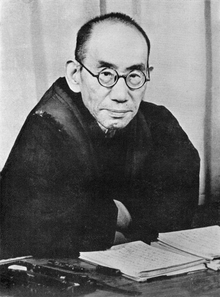Kitarō Nishida | |
|---|---|
 | |
| Born | May 19, 1870 Unokema, Ishikawa, Japan |
| Died | June 7, 1945 (aged 75) Kamakura, Kanagawa, Japan |
| Nationality | Japanese |
| Alma mater | Tokyo Imperial University |
| Era | 20th-century philosophy |
| Region | Japanese philosophy |
| School | Kyoto School |
| Institutions | Kyoto Imperial University |
Main interests | Metaphysics, Aesthetics |
Notable ideas |
|
| The Kyoto School of Philosophy |
|---|
| at Kyoto University |
| Topics |
| Individuals |
| Historical background |
Kitarō Nishida (西田 幾多郎, Nishida Kitarō, May 19,[2] 1870 – June 7, 1945) was a Japanese moral philosopher, philosopher of mathematics and science, and religious scholar. He was the founder of what has been called the Kyoto School of philosophy. He graduated from the University of Tokyo during the Meiji period in 1894 with a degree in philosophy. He was named professor of the Fourth Higher School in Ishikawa Prefecture in 1899 and later became professor of philosophy at Kyoto University. Nishida retired in 1927. In 1940, he was awarded the Order of Culture (文化勲章, bunka kunshō). He participated in establishing the Chiba Institute of Technology (千葉工業大学) from 1940.
Nishida Kitarō died at the age of 75 of a renal infection. His cremated remains were divided in three and buried at different locations. Part of his remains were buried in the Nishida family grave in his birthplace Unoke, Ishikawa. A second grave can be found at Tōkei-ji Temple in Kamakura, where his friend D. T. Suzuki organized Nishida's funeral and was later also buried in the adjacent plot. Nishida's third grave is at Reiun'in (霊雲院, Reiun'in), a temple in the Myōshin-ji compound in Kyoto.[3]
- ^ Nishida Kitaro at the Stanford Encyclopedia of Philosophy
- ^ Yusa Michiko. Zen & Philosophy: An Intellectual Biography of Nishida Kitaro. University of Hawaii Press, 2002, p. 5.
- ^ Yusa Michiko. Zen & Philosophy: An Intellectual Biography of Nishida Kitaro. University of Hawaii Press, 2002, p. 337.